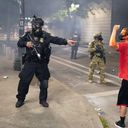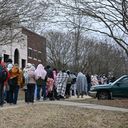Advocates planning 60-mile walk in Texas to highlight the Underground Railroad to Mexico
Advocates, historians, and descendants of enslaved people are planning to join a 60-mile walk in Texas to bring attention to the Underground Railroad to Mexico — a lesser-known route that helped enslaved people escape to freedom.
Why it matters: The "Walking Southern Roads to Freedom," scheduled for March 3 to 9 in South Texas, is the latest development drawing attention to a largely forgotten episode of Black/Latino history amid a new surge of research and advocacy around the route.
Zoom in: Organizers say the walk will begin at La Sal del Rey, a salt lake in Hidalgo County, Texas, and pass many historic sites believed to be connected to the Underground Railroad to Mexico.
- Faith leaders, descendants, artists from Philadelphia and Kansas City, and representatives from the Harriet Tubman Museum and Educational Center in Cambridge, Maryland, are expected to join the seven-day march.
- Organizers say the walk will begin in La Sal del Rey, a salt lake in Hidalgo County, Texas and go through many historic sites believed to be connected to the Underground Railroad to Mexico.
- The event will also include a stop in Mexico to commemorate country's role in the underground walk to freedom. The walk will end in the border town of McAllen, Texas.
The intrigue: The event is a culmination of research by Roseann Bacha-Garza, a program manager for the University of Texas Rio Grande Valley's Community Historical Archaeology Project with Schools in Edinburg, Texas.
- She said the gathering will "increase awareness about the resilience and resolve of freedom seekers of African ancestry who participated in underground railroad-like activities from south Texas to Mexico."
- Bacha-Garza said the plans for the walk began after the school received a National Underground Railroad Network to Freedom designation for the Jackson Ranch Church and Martin Jackson Cemetery in San Juan, Texas, from the U.S. National Park Service.
- Those sites once served as a gateway to Mexico for enslaved people seeking freedom.
Zoom out: The Jackson ranch was located next to another owned by Silvia Hector Webber — dubbed by some historians as the "Harriet Tubman" of the Underground Railroad to Mexico — and her husband, John, who was white.
- The Webbers built a ferry landing on their property to help enslaved escapees move along the Colorado River toward Mexico, says Ohio State history professor María Esther Hammack.
Context: Historians have known for decades that some enslaved Black people in Texas, Louisiana, Oklahoma and Alabama escaped slavery by heading south.
- Oral histories, archives of slave escape ads, and narratives of formerly enslaved people show that fleeing to Mexico had been a possibility leading up to the U.S. Civil War.
- Abolitionists wrote about "colonies" of formerly enslaved Black people popping up in towns across northern Mexico — a country that had abolished slavery in the 1830s.
Yes, but: How many people fled south of the border remained a mystery, and historians debate just how well-organized the network was.
The Plano African American Museum in Plano, Texas, is opening an exhibit on March 6 called "Risking It All For Freedom: Women Who Crafted The Underground Railroad Into Mexico."
- It is being partly organized by the descendants of Silvia Hector Webber.





















